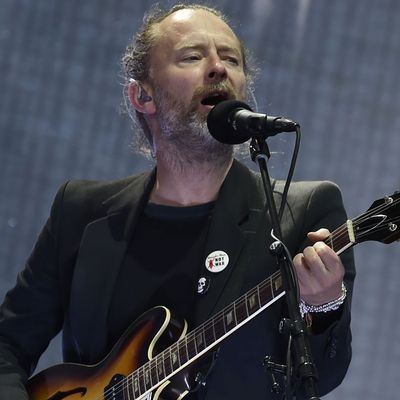
This Wednesday, Radiohead will perform in Israel for the first time since 2000, having played there eight times over the bandÔÇÖs long career. But international attitudes toward Israel have changed drastically over nearly 20 years and, up until now, they havenÔÇÖt had to defend such a concert. In 2005, a global coalition called the BDS (Boycott, Divestment and Sanctions) movement was formed to encourage a total cultural boycott against the country unless Palestinian rights are restored and the West Bank barrier demolished. Many celebrities, including Roger Waters, Riz Ahmed, and Brian Eno, have signed letters and petitions vowing not to work with or in Israel in alliance with the boycott, arguing such action is in the interest of fighting for human rights. An opposing coalition has since emerged, supported by J.K. Rowling, that urges more not less engagement with Israel as the best solution. With dueling efforts to mend regional tensions in place, Radiohead have come under heavy fire for appearing not to choose a side and blindly going ahead with their Tel Aviv concert despite a petition signed by their peers like Waters urging them to cut all ties with Israel and cancel the gig.
Yorke eventually made two statements, one that confirmed Radiohead does not stand with the BDS movement ÔÇô and added that he didnÔÇÖt appreciate being ÔÇ£patronizedÔÇØ by other musicians for their decision ÔÇô and another clarifying that that doesnÔÇÖt mean Radiohead agree with the Israeli government. ÔÇ£WeÔÇÖve played in Israel for over 20 years through a succession of governments, some more liberal than others. As we have in America. We donÔÇÖt endorse Netanyahu any more than Trump, but we still play in America,ÔÇØ Yorke tweeted at director Ken Loach, one of the loudest critics of the bandÔÇÖs concert. But for Radiohead, the unpopular decision to commit to playing Israel cuts much deeper than politics: Without Israel, Radiohead might not even exist.
In most cases, itÔÇÖd be difficult to prove that a lone country could take credit for the success of any artist. (Though just look at Carly Rae Jepsen and Japan.) But Radiohead have long been indebted, to a degree, to Israel for the countryÔÇÖs early support of the band when they needed it most. Their relationship began in late 1992, not long after Radiohead had released their debut album, and smack in the middle of the long waiting game that all new artists must play for their debut single to take off. When most think of ÔÇ£CreepÔÇØ today, phrases like ÔÇ£alt rock standardÔÇØ and ÔÇ£classicÔÇØ usually follow; but over two decades ago, ÔÇ£CreepÔÇØ didnÔÇÖt have that immediate luster. It was too gloomy to be a radio hit in U.K., and barely cracked the Top 40 in America (though it still remains the bandÔÇÖs biggest single here). The future success of ÔÇ£CreepÔÇØ came down to a ripple effect that originated in Israel, when a radio DJ named Yoav Kutner began playing ÔÇ£CreepÔÇØ on repeat, sometimes three times an hour, on Israeli army station Galei Tzahal after receiving a copy from the label. Word of mouth took off there, and soon record label EMI noticed enough to restore some confidence in the band and gave them a chance to play three small club shows in Tel Aviv, plus a TV spot, in March and April 1993.
Radiohead were swarmed by Israeli audiences; rumor has it some fans even tried to rip out YorkeÔÇÖs hair. The band became an overnight success where they least expected it, and Israelis marveled at the fact that a British band would travel there to acknowledge the reception. ÔÇ£This was like, ÔÇÿOh my God weÔÇÖre so international, thereÔÇÖs a band and itÔÇÖs singing in English, we are the best people in the world,ÔÇÖÔÇØ one concertgoer recalled earlier this year. Even then, Yorke referenced the Israeli-Palestinian conflict, reportedly dedicating ÔÇ£Stop WhisperingÔÇØ to ÔÇ£peace in Israel.ÔÇØ However, the pandemonium they experienced abroad in Israel didnÔÇÖt translate back home: ÔÇ£It was like Cinderella, you know? The clock reaches midnight and theyÔÇÖre back to being anonymous,ÔÇØ former EMI Israel head Uzi Preuss remembers. But as the song continued to blow up in Israel, American radio soon caught on, especially on the West Coast. It spread further internationally, and eventually EMI extended RadioheadÔÇÖs tour and rereleased ÔÇ£CreepÔÇØ in 1993, and it hit the Top 10 in the U.K.
With over two decades removed from when Israel first fell in love with Radiohead, it might seem strange for the band to still act beholden to the country. But again, thereÔÇÖs more to the story: As Yorke referenced in his first statement on the controversy, Jonny Greenwood is married to Israeli-born artist Sharona Katan. ÔÇ£All these people to stand there at a distance throwing stuff at us, waving flags, saying, ÔÇÿYou donÔÇÖt know anything about it!ÔÇÖ Imagine how offensive that is for Jonny,ÔÇØ Yorke wrote. Radiohead also have professional ties to Israel ÔÇö their two current tour openers, Shye Ben Tzur (who Greenwood has collaborated with) and Dudu Tassa and the Kuwaitis are both Israeli acts. Israel and RadioheadÔÇÖs mutual appreciation goes well beyond their latest Tel Aviv concert, though this concert is expected to be symbolic: ÔÇ£As far as many Israelis are concerned, Radiohead are an Israeli product,ÔÇØ Ruth Perl Baharir writes for Haaretz. Whether Radiohead will give a now-rare performance of ÔÇ£CreepÔÇØ on Wednesday for the bandÔÇÖs Israeli fans is the real question ÔÇö┬ánot whether theyÔÇÖll play at all.


